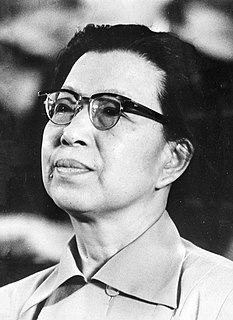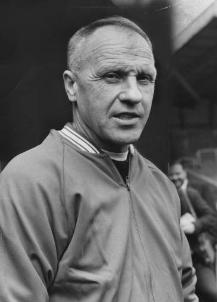A Quote by Deng Xiaoping
In the last couple of years before Chairman Mao's death he said that the "Cultural Revolution" had been wrong on two counts: one was "overthrowing all", and the other was waging a "full-scale civil war". These two counts alone show that the "Cultural Revolution" cannot be called correct. Chairman Mao's mistake was a political mistake, and not a small one.
Related Quotes
It is Chairman Mao who should be held primarily responsible for the Great Leap Forward. But it didn't take him long - just a few months - to recognize his mistake, and he did so before the rest of us and proposed corrections. And in 1962, when because of some other factors those corrections had not been fully carried out, he made a self-criticism. But the lessons were not fully drawn, and as a result the "Cultural Revolution" erupted.
Chairman Mao creatively applied Marxism-Leninism to every aspect of the Chinese revolution, and he had creative views on philosophy, political science, military science, literature and art, and so on. Unfortunately, in the evening of his life, particularly during the "Cultural Revolution", he made mistakes - and they were not minor ones - which brought many misfortunes upon our Party, our state and our people.
Not only did Mao Zedong Thought lead us to victory in the revolution in the past; it is - and will continue to be - a treasured possession of the Chinese Communist Party and of our country. That is why we will forever keep Chairman Mao's portrait on Tiananmen Gate as a symbol of our country, and we will always remember him as a founder of our Party and state. Moreover, we will adhere to Mao Zedong Thought. We will not do to Chairman Mao what Khrushchev did to Stalin.
So far as Chairman Mao's own hopes were concerned, he initiated the "Cultural Revolution" in order to avert the restoration of capitalism, but he had made an erroneous assessment of China's actual situation. In the first place, the targets of the revolution were wrongly defined, which led to the effort to ferret out "capitalist roaders in power in the Party". Blows were dealt at leading cadres at all levels who had made contributions to the revolution and had practical experience, including Comrade Liu Shaoqi.
Chairman Mao's greatest contribution was that he applied the principles of Marxism-Leninism to the concrete practice of the Chinese revolution, pointing the way to victory. It should be said that before the sixties or the late fifties many of his ideas brought us victories, and the fundamental principles he advanced were quite correct.
It should be pointed out that some of the things done after the arrest of the Gang of Four were inconsistent with Chairman Mao's wishes, for instance, the construction of the Chairman Mao Memorial Hall. He had proposed in the fifties that we should all be cremated when we died and that only our ashes be kept, that no remains should be preserved and no tombs built.
We must make a clear distinction between the nature of Chairman Mao's mistakes and the crimes of Lin Biao and the Gang of Four. For most of his life, Chairman Mao did very good things. Many times he saved the Party and the state from crisis. Without him the Chinese people would, at the very least, have spent much more time groping in the dark.
The enormous social change involved in a sexual revolution is basically a matter of altered consciousness, the exposure and elimination of social and psychological realities underlying political and cultural structures. We are speaking, then, of a cultural revolution, which, while it must necessarily involve the political and economic reorganization traditionally implied by the term revolution, must go far beyond this as well.
Whatever the price of the Chinese Revolution, it has obviously succeeded not only in producing more efficient and dedicated administration, but also in fostering high morale and community of purpose. The social experiment in China under Chairman Mao's leadership is one of the most important and successful in human history.
































